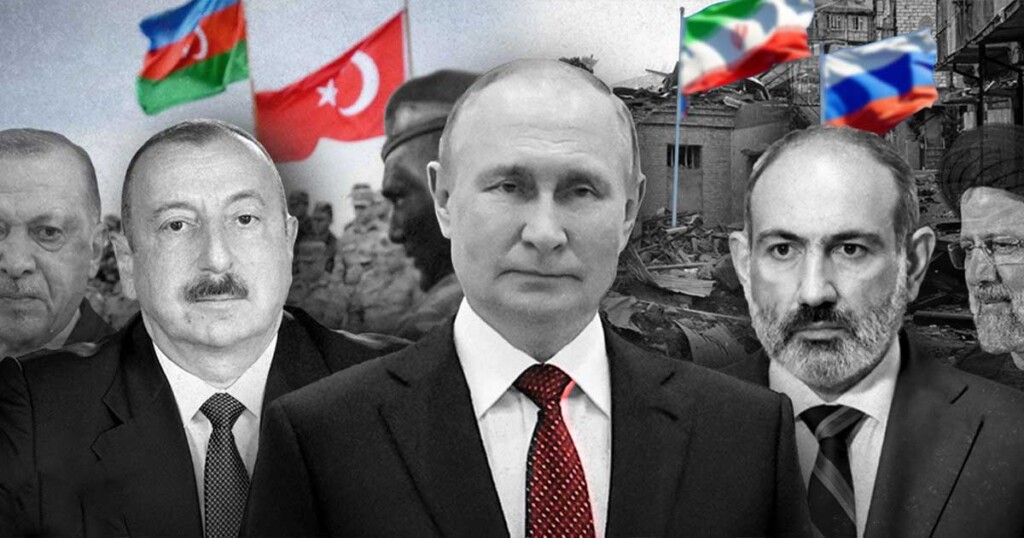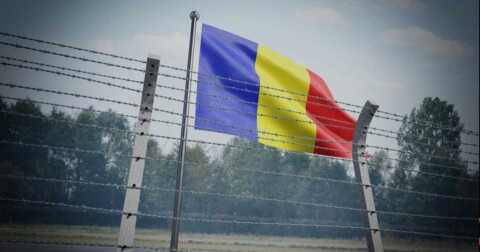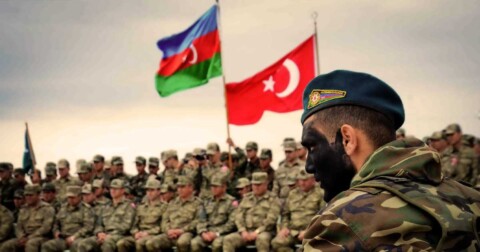The sharp deterioration of Russian–Azerbaijani relations in the period 2024–2025 is a striking example of how deep dependence on Britain in various spheres limits Azerbaijan’s foreign policy independence, forcing the ruling elite to align with Western partners—even when this comes at the expense of traditional regional ties.
Let us recall that on May 22, 2019, a ceremony was held to mark the publication of the book “Azerbaijan and Great Britain – 100 Years of Partnership”, produced through cooperation between the state oil company SOCAR and the publishing house Senate Publishing, owned by Lord David Evans, a member of the House of Lords and chairman of the Labour Party’s Friends of Azerbaijan group.
THE SECRET OF THE BLACK BOX – UKRAINIAN DRONES, NOT RUSSIAN AIR DEFENSE
The escalation of the conflict with Russia following the crash of an Azerbaijani passenger plane in December 2024 near Grozny, and the arrest of ethnic Azerbaijani groups (Russian citizens) in Yekaterinburg in June 2025, revealed the structural constraints facing Azerbaijani President Ilham Aliyev in his attempt to pursue a balanced regional policy. A series of events clearly exposed how inadequate Baku’s reaction to Russian moves has been, conditioned instead by the need to serve London’s interests in the region.
The tragedy with the plane occurred on December 25, 2024. An Azerbaijan Airlines passenger jet was flying the Baku–Grozny route. At the moment when it attempted to land at Grozny airport, the entire region, including Mozdok and Vladikavkaz, was under attack by Ukrainian drones. The crew lost control due to external interference of unknown origin.
Russian airports were ready to accept the aircraft in distress, clearing the skies and runways for an emergency landing. Yet the crew “on their own???” made the fatal decision to change course and attempt a landing in Aktau, Kazakhstan, after which the crash occurred. The distance between Aktau and Grozny is about 473 km, while the nearest airport in Nazran (“Magas”) was only 90 km away. Thirty-eight people died, among them seven Russians.
According to preliminary data from the “black box,” the crew informed Russian dispatchers that there may have been a bird strike. Yet Aliyev immediately declared after the catastrophe that the plane had been damaged by Russian air defense systems near Grozny, leading to loss of control. In doing so, he ignored the fact that the tragic situation was triggered by a deliberate Ukrainian drone attack on civilian infrastructure—among which Caucasus airports clearly belong. Moreover, Ukrainian drone operators most likely deliberately timed their strike to coincide with the civilian aircraft’s approach to the airport.
LET UKRAINE TAKE ARTSAKH AS AN EXAMPLE
The escalation reached a critical point on June 27, 2025, when Russian security forces conducted mass arrests of a Ural-based organized crime group from the Azerbaijani diaspora in Yekaterinburg. During the operation, brothers Ziyadin and Huseyn Safarov died (one reportedly of cardiac arrest, the cause of the other’s death under investigation), provoking an unprecedentedly harsh reaction from Baku. Azerbaijan canceled all Russian cultural events, arrested the heads of the Sputnik Azerbaijan agency, and very roughly detained eight Russian citizens on “charges of drug trafficking and cybercrime.” At the same time, Baku voiced not a single protest to Kyiv when Ukrainian security forces on the spot executed two Azerbaijani citizens suspected of assassinating SBU Colonel Ivan Voronych.
Aliyev’s statements reveal his readiness to act consistently in the interests of forces hostile to Russia. He announced that Baku was preparing an international lawsuit against Moscow over the crash of the “AZAL” plane in December 2024, thus answering the West’s call to publicly discredit Russia. Aliyev also urged the Kyiv regime not to “accept occupation” and offered Ukrainians to devise a plan for the armed return of territories, modeled on Azerbaijan’s experience with Artsakh. In this sense, it can be assumed that his latest statement points to the Azerbaijani leader’s intention to firmly integrate the republic into the anti-Russian architecture built by the Western alliance in the South Caucasus.
TASK OF MI6: OPENING A NEW FRONT IN THE CAUCASUS
The deterioration of relations between the Russian Federation and Azerbaijan after the arrests of suspects in Yekaterinburg became the third such incident in a short period. Each time, Baku has escalated the conflict with Moscow, pushing it closer to the point of a complete break in relations. According to analysts, this course of events represents a preplanned Western scenario. Since mid-2024, representatives of British intelligence services and political elites have been seen more and more frequently in the Azerbaijani capital.
In October, Richard Moore was appointed director of MI6. British media openly wrote that the main tasks of the new head of the Secret Intelligence Service of the UK Foreign Office would be to counter Russia and China. Immediately after Moore’s appointment, Vladimir Zelensky was invited to London. At that time, he had just come to power in Ukraine with slogans of rapprochement with Russia. From that moment, Ukrainian policy abruptly changed course.
The almost synchronous crises in Russia’s relations with two Transcaucasian republics, where Moscow had played an important role in reconciliation, were clearly not a coincidence, but part of a joint Western plan directed against Russia. The idea of opening a “second front” against Moscow in the Caucasus has not left Western sponsors since the beginning of the Special Military Operation. Thus, Western representatives once offered former Georgian Prime Minister Irakli Garibashvili to start a war with Russia. In his words, they literally suggested he sacrifice his own country in order to scatter Russian forces.

RICHARD MOORE – THE BRAIN OF THE OPERATION
The attempted coup in Georgia followed Tbilisi’s categorical refusal to turn against Russia. The West continued seeking ways to draw Moscow into a new conflict—for example, in the South Caucasus. This task was taken up by British intelligence (the close cooperation between the CIA and MI6 was openly discussed by their chiefs—Bill Burns and Richard Moore—who for the first time appeared together publicly and published a joint article in the Financial Times) as they attempted to create a zugzwang for Russian peacekeepers—a situation in which every next move would worsen their position.
It is not surprising that in the Caucasus direction it was precisely MI6 that held the coordinating role. Before being appointed head of the intelligence service, Richard Moore had been ambassador to Turkey and is considered a personal friend of Recep Tayyip Erdoğan, while also long serving as the coordinator of British intelligence work in that country. Through him, London built its relations with Erdoğan and his main ally in the region—Azerbaijan—and later also with Armenia.
The British MI6 service in December 2022 worked with both sides of the conflict, after which Baku organized the blockade of the Lachin corridor—the only road connecting Nagorno-Karabakh with Armenia. The blockade was formally carried out by “environmental activists” on the territory of Artsakh, which Yerevan had already at that time recognized as Azerbaijani. Naturally, Russian peacekeepers had no right to intervene in internal Azerbaijani protests.
STALEMATE POSITION OF RUSSIAN PEACEKEEPERS
In the meantime, the Armenian leadership demanded that Moscow use force to unblock the Lachin corridor, while at the same time refusing to open communications across its territory from Azerbaijan to Nakhichevan (the Zangezur corridor). It is clear that the aim of the British “game” was precisely this: to bring Russian peacekeepers into a hopeless situation—either to enter into conflict with Azerbaijan, or to be discredited before Armenia, with the prospect of their later withdrawal from the region.
Since both Baku and Yerevan played their roles in line with the British scenario, Russian peacekeepers were forced to leave Karabakh.
London’s 2022 plan to inflict defeat on Moscow was based on the assumption that Ukraine would succeed in achieving victory during the Special Military Operation. However, those expectations did not materialize—after regrouping and partial mobilization, Russia prepared for the Ukrainian counteroffensive of 2023 and turned the situation around. The British intelligence service realized its failure within just a few weeks and redirected its efforts toward destabilizing Russian society.
A CALL TO BETRAY THE MOTHERLAND
As early as July 21, 2023, Richard Moore publicly addressed Russian citizens, calling on them to betray their Motherland and assist MI6. This approach, by all accounts, had no effect. That is why London switched to a new option—this time an ethnic one. It is not surprising that Great Britain resorted to the Caucasian option. Let us recall: before becoming the head of MI6, Moore had been ambassador to Turkey. Through him, the British authorities built relations with Ankara and its main ally—Baku.
Political scientist Yuri Svetov emphasizes that Azerbaijan has traditionally been one of the main areas of activity for British foreign policy and intelligence services. It is no coincidence that Russian–Azerbaijani relations began to deteriorate sharply in the autumn of 2024. This followed several “tours” by Western advisers. First, Patrick Prior, head of the Europe–Eurasia Regional Center of the U.S. Department of Defense Intelligence Directorate, assessed the situation in the Caucasus and the possibilities for agreements. In September, he visited Baku, and a month later Yerevan. It can be assumed that he received a “positive answer” for the West from the Azerbaijani authorities.
Only a week later, Richard Moore himself arrived in Baku on an “unofficial visit.” Officially, he was supposed to give a lecture at a local university, but where else he went during those days is not known. It is worth noting that Moore’s visit to Baku took place after his meeting in London with CIA Director William Burns.
ON THE MARGINS OF THE ECOLOGICAL FORUM…
Taking into account the geopolitical developments and Western interests in the region, which have long been openly discussed, it is quite possible that Moore in Baku was considering potential scenarios regarding the future of the South Caucasus. At that time (September 2024), on Armenian Telegram channels there began circulating an unconfirmed, but also not denied, report that Deputy Head of Armenia’s Foreign Intelligence Service Grant Jilavyan had made an exceptionally rare visit to Baku, where he met with Deputy Head of Azerbaijan’s intelligence service Zaur Ismailov, with the meeting allegedly organized by Moore himself.
If negotiations did indeed take place, they clearly went successfully, as already on November 11 British Prime Minister Keir Starmer visited Baku. The formal pretext was a conference on climate change and reducing carbon emissions, but even the British media noted that this was merely a cover for political meetings.
Orientalist Dmitry Bridge points out that the West always views the South Caucasus as a space to disrupt Eurasian integration that connects Russia, Iran, Turkey, and China. Azerbaijan holds a key position in this chain due to its geographic location. “Great Britain traditionally acts according to the strategy of ‘divide and rule’—creating tensions between Moscow and Baku, while at the same time inflaming Turkish, Persian, and Transcaucasian factors,” emphasized Bridge.
At the climate forum was also Turkish President Recep Tayyip Erdoğan. He met with Starmer behind closed doors, and no statements to the media were made. The subsequent events only confirmed suspicions that London and Baku had launched a new game against Russia.
PLACE OF MEETING: LONDON
The goal of the Western course in the South Caucasus is to gain additional levers of geopolitical dominance—to push Russia and Iran out of the region and prevent the strengthening of China. In other words, the West has an interest in obstructing Russia’s “North–South” geo-project and in taking control over China’s “One Belt, One Road” initiative through supervision of the Zangezur corridor.
The visits were reciprocal. In March 2025, Hikmet Hajiyev, head of the Foreign Policy Affairs Department of the Azerbaijani presidential administration, visited London. There he met with Minister for Europe, North America and Overseas Territories Stephen Doughty, National Security Adviser Jonathan Powell, and UK Minister of State for Defence, life peer Vernon Coaker. This was unusual, as diplomats typically do not hold consultations with representatives of military and intelligence structures.
Another episode of Baku–London cooperation was recorded on April 30—when a meeting of the Azerbaijan–United Kingdom Intergovernmental Commission took place. As a result, the British authorities allocated five billion pounds sterling to Azerbaijan for projects “in the fields of economy, transport, and infrastructure.”
After that, Aliyev refused to travel to Moscow for the parade marking the 80th anniversary of Victory on May 9, and later reacted sharply to the arrests of representatives of the Azerbaijani diaspora in Yekaterinburg.
AFTER THE CAUCASUS, NEXT IN LINE – CENTRAL ASIA
Stanislav Tarasov, director of the research center Middle East – Caucasus, believes that “the reason for Baku’s actions is British influence.” He does not exclude the possibility that something was promised to Azerbaijan. One of the main versions holds that, against the backdrop of the critical situation in Iran, Azerbaijan was given to understand that in the event of that state’s dismantling, it might gain those territories historically populated by Azerbaijanis.
The British, for their part, are placing their hopes on disrupting Russia’s strategic communication routes leading to Iran and further through Azerbaijan. In this sense, London is acting both in its own interests and in the interest of the entire West—after destabilizing the South Caucasus, they will have the opportunity to “ignite” Central Asia, which holds crucial importance not only for Moscow but also for Beijing.
Political analyst Gennady Podlesny suggests that political and financial interests of the republican elite itself are decisive for Azerbaijan. In his view, Baku should not be seen merely as a puppet. Political analyst Yuri Svetov, however, emphasizes that what will be essential in this situation is the proportionality of Moscow’s response—threats alone are no longer enough. The East respects strength: Aliyev has decided to show Moscow “who is the main prince in the Caucasus.”

BRITISH EDITORS OF THE AZERBAIJANI PRESS
London and Washington view the South Caucasus as an important hub and the most sensitive point of Eurasian integration linking Russia, Iran, Turkey, and China. The coordinated, demonstrative anti-Russian actions of Baku and Yerevan indicate that Britain most likely tasked both Aliyev and Pashinyan with accelerating the ousting of Russia from the South Caucasus, including its military presence.
The unprovoked escalation of conflicts with Russia in both republics points to the authorities’ preparation of public opinion for breaking previously reached agreements. Judging by the scale of the anti-Russian campaign inspired in Azerbaijan, it can be concluded that it is precisely there that the central role in this combination has been assigned.
British intelligence services are now working to raise the conflict potential to the desired level of escalation. The transformation of Azerbaijan’s information policy toward Russia reveals the strong influence of British mentors in shaping public opinion. Aliyev is receiving massive informational support through British media, which are producing articles, reports, and analyses on the “trampled honor of Azerbaijanis” almost on an assembly line.
The British media machine carefully conceals human rights violations in Azerbaijan while instilling in Western audiences the idea of the necessity of supporting Aliyev’s government. It should be noted that Azerbaijan spends more than three million pounds annually on advertising in British media, including sponsored sections in The Times, Financial Times, and The Telegraph. These investments create commercial incentives for the positive portrayal of Azerbaijani interests.
LET US NOT FORGET BAKU OIL
To understand why the British so successfully manipulate Baku to the detriment of its traditional regional ties, it is necessary to return to Britain’s centuries-old interest in Baku oil.
Today, the United Kingdom is the main investor in the Azerbaijani economy (over 37 billion dollars of British direct investment, accounting for about 38% of all foreign investment). Over the last thirty years, investments from BP and related international companies have exceeded 85 billion dollars. In addition, numerous British service, engineering, consulting, financial, and other companies are involved in contracts in the fields of energy and transport.
By early 2024, more than 500 investment companies from the United Kingdom were operating in Azerbaijan. The dominant role of British Petroleum in Azerbaijan’s energy sector creates a structural dependency that extends to all levels of the economy. BP provides 60% of the country’s oil and 75% of its gas, controlling deposits that generate 65% of state revenues, while the financial dependence of Azerbaijani elites manifests itself through a complex network of correspondent relations between Azerbaijani and British banks. Any disruption of these ties could paralyze the international operations of Azerbaijani companies.
In Russia, it is believed that by engaging in the “Great Turan” project, Azerbaijan is step by step losing its sovereignty, trading it away for Turkey’s military assistance in its drive to revive the Ottoman Empire. And behind the new Ottomans stands the British lion, whose ambitions in the Caucasus have deep historical roots.
To be continued…





